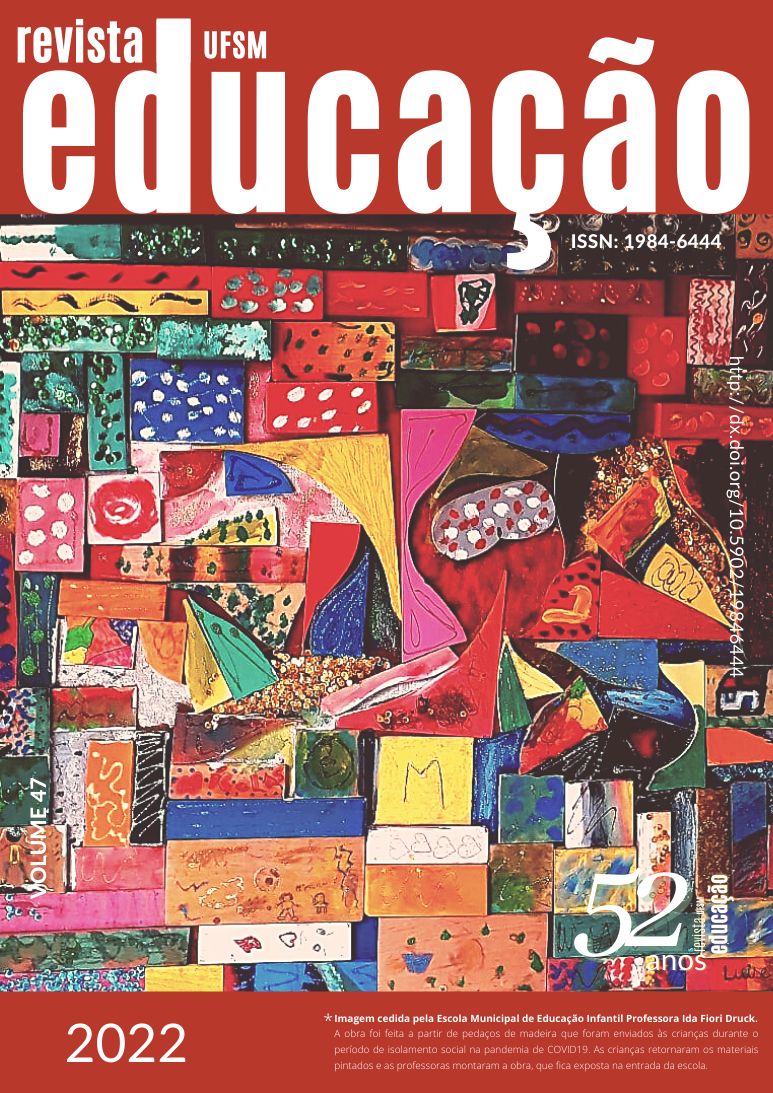A Anti-educação de Nietzsche: Assim Falou Zaratustra como um Poema de Auto-trans-formação
DOI:
https://doi.org/10.5902/1984644461315Keywords:
Zaratustra, Educação, Auto-trans-formação., AntieducaçãoAbstract
The aim of this article is to analyze how a work Thus Spoke Zarathustra, by Friedrich Nietzsche, can be understood as a process of self-transformation, according to the Nietzschean perspective and, consequently, how such perspective presents itself, from its perspectives. aspects, such as an anti-education, insofar as it is opposed to the traditional educational model. Therefore, we will start by analyzing the four main aspects of what this anti-education by Nietzsche would be: the teaching of solitude, the teaching of elevation, the teaching of great reason and the teaching of affirmation. It is concluded that such aspects serve as a background to reflect on the four central lessons of Nietzsche's work (death of god, beyond-man, will to power and eternal return), forming an interpretive framework that articulates the philosophical lessons- existential with the educational perspectives contained in them, which result in the inversion of the traditional perspective of education, supposedly oriented towards gregariousness and towards what the German philosopher calls the negation of life.
References
GIACOIA JÚNIOR, O. Nietzsche como Psicólogo. São Leopoldo – RS: Editora
UNISINOS, 2001.
JULIÃO, José Nicolau. O ensinamento da superação em Assim Falou Zaratustra.
Campinas: Editora Phi, 2016.
LAMPERT, Laurence. Nietzsche’s teaching: an interpetation of Thus Spoke
Zarathustra. New Haven: Yale: Yale University Press, 1986.
NIETZSCHE, Friedrich. A gaia ciência. Trad. Paulo César de Souza. São Paulo:
Companhia das Letras, 2012.
NIETZSCHE, Friedrich. Além do bem e mal: prelúdio a uma filosofia do futuro.
Tradução, notas e posfácio Paulo César de Souza. – São Paulo: Companhia das
Letras, 2005.
NIETZSCHE, Friedrich. Anticristo: Maldição ao cristianismo: Ditirambos de Dionísio.
Tradução, notas e posfácio Paulo César de Souza. – São Paulo: Companhia das
Letras, 2007.
NIETZSCHE, Friedrich. Assim Falou Zaratustra: um livro para todos e para
ninguém. Tradução, notas e posfácio Paulo César de Souza. – São Paulo:
Companhia das Letras, 2011.
NIETZSCHE, Friedrich. Ecce homo: como alguém se torna o que é. Trad. notas e
posfácio de Paulo César de Souza. São Paulo: Companhia das Letras, 1995.
NIETZSCHE, Friedrich. Humano, demasiado humano: um livro para espíritos livres
Tradução, notas e posfácio Paulo César de Souza. – São Paulo: Companhia das
Letras, 2000.
NIETZSCHE, Friedrich. Humano, demasiado humano: um livro para espíritos livres
volume I. Tradução, notas e posfácio Paulo César de Souza. – São Paulo:
Companhia das Letras, 2008.
NIETZSCHE, Friedrich. Crepúsculo dos Ídolos. Tradução, notas e posfácio Paulo
César de Souza. – São Paulo: Companhia das Letras, 2006.
OLIVEIRA, Jelson. A solidão como virtude moral em Nietzsche. – Curitiba:
Champagnat, 2010.
SOUZA, Paulo César de. Notas. In: Assim Falou Zaratustra: um livro para todos e
para ninguém. – São Paulo: Companhia das Letras, 2011.
Published
How to Cite
Issue
Section
License
Copyright (c) 2022 Educação (UFSM)

This work is licensed under a Creative Commons Attribution-NonCommercial 4.0 International License.
Declaration of originality
We declare that all articles present in the journal Educação (UFSM) are originals and were not submitted for publishing on any other publication, as a whole or a fraction. We also declare that, after being published by Educação (UFSM), a paper will not be submitted to another journal within two years. After this time, our journal transfers the publishing rights to the authors, with a permit granted by the Editorial Council.
We also acknowledge that the originals’ submission to Educação (UFSM) implies on a transference of copyright for physical and digital publishing to the journal. In case of noncompliance, the violator will receive sanctions and penalties predicted by the Brazilian Copyright Protection Law (n. 9610, dated 19/02/98).
Attribution 4.0 International (CC BY 4.0)
This license lets others remix, transform, and build upon the material for any purpose, even commercially, and copy and redistribute the material in any medium or format.

This work is licensed under a Creative Commons Attribution 4.0 International (CC BY 4.0)






